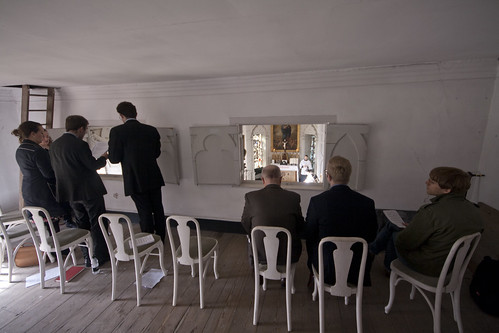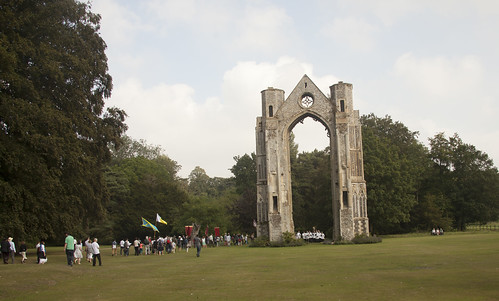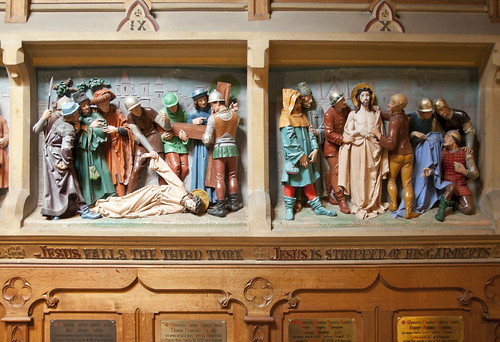--------------------------------------------------
 |
| Tenebrae: Solemn Offices of Holy Week, abolished in the Ordinary Form after Vatican II |
The
liturgical year is to be revised so that the traditional customs and discipline
of the sacred seasons shall be preserved or restored to suit the conditions of
modern times; their specific character is to be retained, so that they duly
nourish the piety of the faithful who celebrate the mysteries of Christian
redemption, and above all the paschal mystery.
Not only is there no mandate to abolish the Season of Septuagesima, but it is clearly ruled out. Both because all the seasons are to be 'preserved or restored', and you can't preserve or restore something by annihilating it, and because this applied a fortiori to Septuagesima since it is part of the preparation for 'the Paschal Mystery', Easter, to which this passage (rightly) accords a special importance.
If you accept Vatican II, you'd better get over to Mass celebrated in the Extraordinary Form during this season. Because in the Ordinary Form it does not exist.
But we can say the same about a number of things. Take Latin. Here is Sacrosanctum Concilium again, section 36.
Particular law remaining in force, the use of the Latin language is to be preserved in the Latin rites.
You can't 'preserve' a thing by abolishing it. If you want to be faithful to the Council, you'd better attend a Mass in Latin. That will, sadly, be almost impossible in the Ordinary Form, so it had better be the Extraordinary Form.
Isn't this word 'preserve' interesting? Talking of rites in general, Sacrosanctum Concilium declares (para 4)
Lastly, in faithful obedience to tradition, the sacred Council declares that holy Mother Church holds all lawfully acknowledged rites to be of equal right and dignity; that she wishes to preserve them in the future and to foster them in every way.
Isn't this word 'preserve' interesting? Talking of rites in general, Sacrosanctum Concilium declares (para 4)
Lastly, in faithful obedience to tradition, the sacred Council declares that holy Mother Church holds all lawfully acknowledged rites to be of equal right and dignity; that she wishes to preserve them in the future and to foster them in every way.
Following the Council, the Dominican Order effectively forbade the Domincan Rite, a situation which only changed with Summorum Pontificum in 2007. Forbidding something, however, is not a way of preserving and fostering.
 |
| The Dominican Rite: effectively suppressed after the Council |
For this purpose the rites are to be simplified, due care being taken to preserve their substance;
Again, it is impossible to preserve the substance of a rite by abolishing it. But that is what happened to the Prayers at the Foot of the Altar and the Last Gospel. The ancient Offertory Prayers were also removed, to be replaced with new ones with a markedly different 'substance'. They were not 'preserved'.
Again:
114. The treasure of sacred music is to be preserved and fostered with great care.
Now music continued to exist after the Reform, but the process cannot be described as one of preservation. What existed before - Gregorian Chant and Sacred Polyphony - was destroyed, with so few exceptions that, at its low ebb, they could be counted on the fingers of one hand, as far as the Ordinary Form is concerned.
 |
| Chant and Polyphony: for practical purposes they ceased to exist in the Ordinary Form |
How about sacred art? Para 123:
Thus, in the course of the centuries, she has brought into being a treasury of art which must be very carefully preserved.
Again, 129:
In consequence they [clerics] will be able to appreciate and preserve the Church's venerable monuments, and be in a position to aid, by good advice, artists who are engaged in producing works of art.
To labour the point, art and monuments cannot be preserved by being destroyed. If it means anything, this clause means that what happened to St Chad's Cathedral, Birmingham, and to a million other churches around the world was wrong.
What are those who defend the liturgical reform to say about these passages? They can point out that Sacrosanctum Concilium is not infallible, since the only things in a General Council which are infallible are the anathemas (lists of condemned propositions which are found in every other General Council in the history of the Church, but which the Fathers of Vatican II eschewed).
They can point out that the practical decisions made in the course of a liturgical reform are prudential, and the guidelines given by the Council are generally prudential, and that applying them is prudential: in short, it is impossible to draw a simple line from doctrine to what actually happened in the reform.
They can point out that, as far as the law of the Church is concerned, the Pope has the authority to promulgate new rites, and the Council was actually not strictly necessary.
Defenders of the reform very seldom make these points, however: they prefer to ignore the problem. It is left to me to defend Pope Paul VI from the charge of heresy implicitly levelled against him by a liberal who thinks that deviations from Vatican II are incompatible with the Faith (or thinks that 'conservative' Catholics should think so).
The reason is simple: they don't want to shatter the illusion that those attached to the Traditional Mass are being wickedly disloyal to Vatican II, and have placed themselves irretrievably in the wrong. But if Traditionalists have done this, the reformers of the liturgy, and their supporters, have done it with knobs on.
 |
| Ruins of the Priory at Walsingham, visited by LMS pilgrims. From the point of view of 'preserving' sacred art, many Catholic churches haven't done much better since the Council. |



